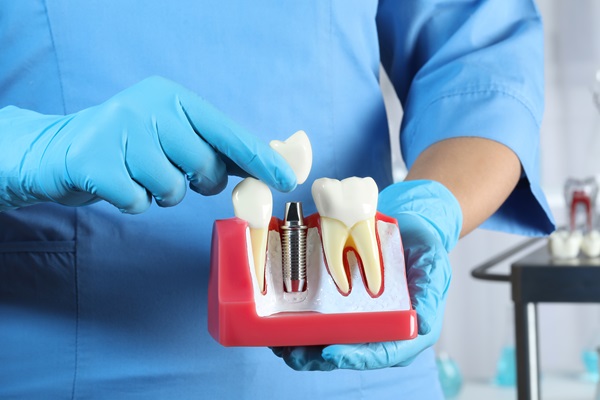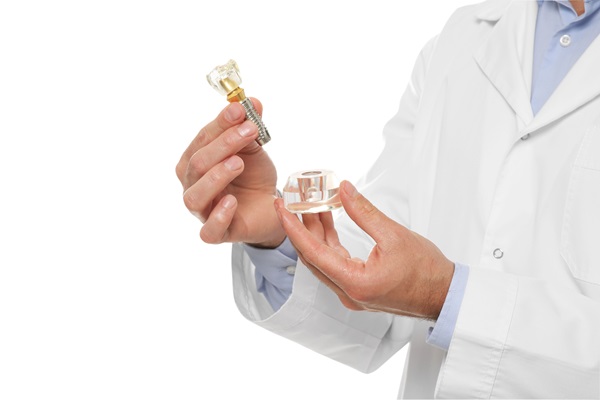How To Prepare for Placement of Dental Implants

About 3 million people in the United States have dental implants, states the American Academy of Implant Dentistry. Implants offer a variety of benefits. Functionally, they prevent further bone loss, make it easier to bite and chew food, make speech flow more naturally, support adjacent natural teeth, and are a permanent solution that will not fall victim to cavities. Aesthetically, they improve the smile, improve facial structure, and are made to match the patient's natural teeth. Patients who are interested in implant surgery must prepare for the procedure.
How to prepare for implants
The way that a patient prepares to receive implants from a dentist will vary depending on specific health requirements and the dentist's personal and professional opinions.
1. Have a dentist perform a comprehensive exam
A patient must start by receiving a comprehensive exam from a dentist. The dentist can examine the patient to determine if they are a good fit for the procedure. This includes deciding whether the patient needs an antibiotic before the procedure, determining if there are any allergies or medication reactions to navigate, and outlining a plan for any jaw-shaping treatment that must first be completed. The evaluation helps the dentist to create a comprehensive treatment plan and helps the patient to prepare for the implant procedure itself.
2. Take any prescribed medications
If the dentist requests it, the patient may need to start a course of antibiotics before receiving dental implants. If the patient does not need to take antibiotics, regular medications should still be taken as directed, unless the dentist and a primary care physician decide otherwise for the duration of the implant process. If the patient does need antibiotics, it is important to take the full prescription's worth and to do so exactly as directed, as they are meant to help the immune system keep any infection at bay during the procedure and the recovery period afterward.
3. Prepare for the appointment itself
Depending on the dentist's instructions, the patient may need to fast for up to 12 hours before the procedure. For this reason, it is important for the patient to eat the evening before the procedure and to avoid food the morning of. Following any other instructions from the dentist is vital for a successful procedure as well. At a minimum, the patient should wear comfortable, loose-fitting clothing to ensure comfort during and immediately after the procedure.
4. Prepare for the healing process
Unlike many other teeth replacement methods, which result in a new set of teeth rather quickly, implants take time. Depending on the patient's specific situation and body's healing abilities, the total process from placing the implants to having a full mouth of teeth may take anywhere from eight to 12 months.
Much of this time consists of waiting for the treatment area to heal. The healing time after the placement of the dental implants is the longest period, so the client should be prepared to be patient and wait until the gums have healed enough to proceed to the next step. Following the dentist's instructions will help ensure the fastest healing time possible.
Schedule aftercare in advance as well
In addition to preparing for the procedure itself, the patient should schedule all aftercare in advance. The effects of the procedure will make it difficult to plan care after the procedure. The patient should consider their needs beforehand. There will be soreness and swelling, so plan to take several days off work to rest. Stock up on over-the-counter pain medication and soft foods to keep on hand for the first few days as well. Avoid exercising until healed and if necessary, try to schedule household help such as cleaning or childcare for the first two days. Expect to resume a light schedule about one week after the surgery.
Conclusion
People who are interested in receiving dental implants should speak to a dentist to learn about the options available. Although there are many benefits to this replacement method, not everyone is a good candidate for the procedure, so part of the consultation will consist of determining if implants are a viable option. The dentist may also determine that implants are only feasible after additional procedures, such as a tooth extraction or bone graft to add density to the jaw. Also, because the procedure is more invasive than others, potential patients should learn all about the pros and cons before deciding to go through with it.
Request an appointment here: https://gallodental.com or call GDC Smiles at (770) 504-5725 for an appointment in our Gainesville office.
Check out what others are saying about our dental services on Yelp: Dental Implants in Gainesville, GA.
Recent Posts
In general dentistry, dental implants replace missing teeth roots. They can be fitted with crowns, dentures, or bridges to replace missing teeth. Implants typically come in the form of a titanium screw or rod placed inside the patient’s jawbone. They fuse with bone tissues around them, becoming one with the patient’s jaw.Implants are the only…
Full mouth dental implants are an option that many patients choose when they need to replace their missing teeth. Our smile is the first impression we have when meeting a new person. We all want that impression to be warm and welcoming. When our smile is somewhat imperfect, we tend to lack confidence and feel…
The introduction of dental implants has provided a solution to tooth replacement that goes beyond mere function to address the core of personal well-being. Loss of teeth has an impact on a lot more than just dental health — it impacts chewing, talking ability, and confidence. This is where dental implants come into play as…
Getting dental implants is a popular way to replace missing teeth. These oral prosthetics replace lost teeth roots and are designed to last a lifetime.Implants can be used to replace one or more teeth. Crowns, dentures, or bridges are attached to the implants, depending on the patient’s needs.No other oral prosthetic used to replace missing teeth…


